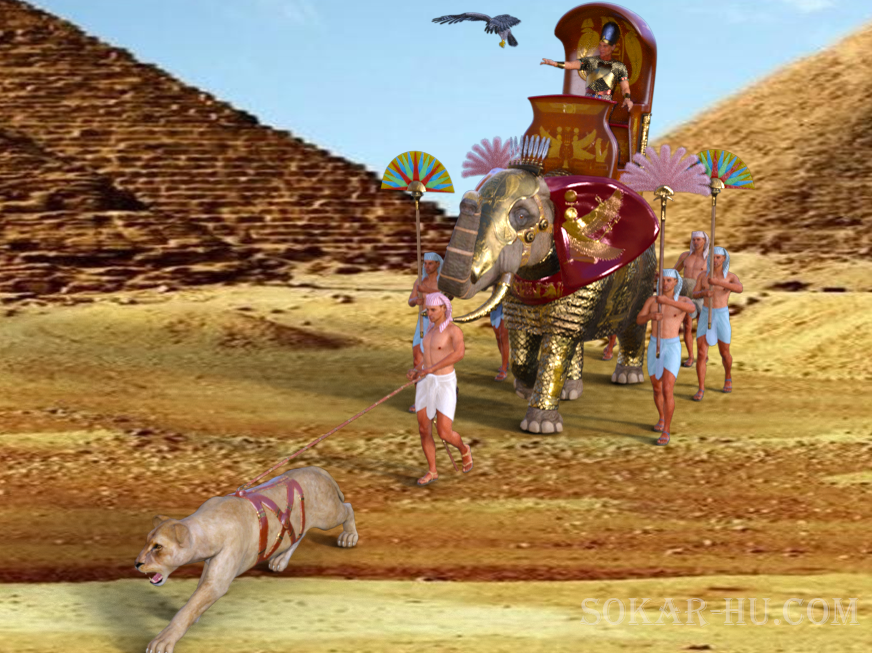Akhenaten: The Heretic Pharaoh Who Tried to Rewrite Egypt’s Religion
The Radical Reign of a Visionary King Who Challenged the Gods
In the vast, golden tapestry of ancient Egypt’s history, no figure is as controversial—or as captivating—as Pharaoh Akhenaten. He wasn’t just a ruler. He was a revolutionary who dared to upend 2,000 years of tradition, reshape religion, and even change the very look of Egyptian art. Some saw him as a visionary. Others called him a heretic.
But one thing’s certain: Akhenaten was unlike any other pharaoh.
Who Was Akhenaten?
Originally born as Amenhotep IV, Akhenaten ruled during the 18th Dynasty of Egypt (around 1353–1336 BCE), a time of immense power, wealth, and international influence. As the son of Amenhotep III and Queen Tiye, he was born into royalty—but his reign would take a radically different path.
Early in his rule, he renamed himself Akhenaten, meaning “Effective for the Aten”, and began one of the most dramatic spiritual overhauls in ancient history.
The Rise of the Sun Disk
At the heart of Akhenaten’s revolution was his devotion to a single deity: the Aten, represented as a radiant sun disk extending rays that ended in small, offering hands. While Egyptian religion had always been polytheistic, filled with gods like Ra, Osiris, Isis, and Amun, Akhenaten focused worship on Aten alone.
This was not just religious preference—it was political rebellion.
☀️ Key Shift: Akhenaten closed temples to other gods, erased names of powerful deities like Amun, and redirected religious power to himself as the sole intermediary between Aten and the people.
Some scholars even suggest this was the world’s first attempt at monotheism, predating major Abrahamic faiths.
Amarna: The City of the Sun
Akhenaten’s religious revolution was so sweeping, he built an entirely new capital city from scratch: Akhetaten (modern-day Amarna), meaning “The Horizon of the Aten”. In just a few years, the city rose from desert dust, filled with open-air temples and sunlit courtyards—built to glorify the Aten.
The royal family moved in, and for a brief period, it became the cultural and spiritual heart of Egypt. Life there was centered around natural light, artistic expression, and an unusual kind of intimacy with the royal family.
Art Turned Inside Out
Under Akhenaten, Egyptian art changed as radically as its religion.
Gone were the rigid, idealized depictions of pharaohs as eternally youthful warriors. In their place came elongated heads, curved torsos, drooping bellies, and intimate family scenes. Akhenaten himself was portrayed with strangely androgynous features—leading some to wonder if he suffered from a disorder, was intersex, or simply wanted to break artistic convention.
🎨 Famous Imagery: Carvings from Amarna show Akhenaten and his wife Nefertiti playing with their children under the sun’s rays—a human, tender scene never before seen in pharaonic art.
Nefertiti and the Mystery of the Royal Family
Akhenaten’s queen, Nefertiti, remains one of the most iconic women of the ancient world. With her striking features immortalized in the famed Berlin bust, Nefertiti was not merely a consort—she was co-ruler, high priestess of Aten, and possibly even pharaoh herself after Akhenaten’s death (under the name Neferneferuaten).
Their children included six daughters, and possibly the famous Tutankhaten—who later became the boy-king Tutankhamun. After Akhenaten’s death, Tutankhamun famously reversed his father's policies, restoring the traditional gods and renaming himself “Living Image of Amun.”
The Backlash and Erasure
After Akhenaten’s death, a campaign of damnatio memoriae (damnation of memory) was launched against him. His name was removed from monuments, his city was abandoned, and his religious reforms were buried—both literally and figuratively.
To later rulers like Horemheb and Ramses II, Akhenaten represented dangerous instability and divine disrespect.
⛔ Legacy Suppressed: For centuries, Akhenaten was nearly erased from Egyptian history. It wasn’t until modern archaeology rediscovered Amarna that his story reemerged in all its complexity.
Was Akhenaten a Madman or a Messiah?
Historians are still divided.
-
Some see him as a proto-monotheist, a spiritual pioneer who saw divine unity in the sun.
-
Others view him as a narcissist who dismantled institutions to centralize power.
-
Some even link him to the roots of biblical thought, suggesting that Moses and Akhenaten shared similar religious ideas.
One thing is clear: Akhenaten changed the face of Egypt—literally and figuratively.
Final Thoughts: A Pharaoh Out of Time
Akhenaten remains a puzzle: a sun-worshipper in a world of gods, an artist in a world of warriors, a reformer whose changes didn’t survive—but whose influence still sparks debate today.
In a civilization built on tradition and eternity, Akhenaten dared to say:
“Let there be light. Let it be new.”
Pharaoh Akhenaten Related Articles
Military Life

Pharaoh Akhenaten moved the Ancient Egyptian capital from Thebes to a new city, ancient Akhetaten or modern-day Amarna. Military Life was strict and in an attempt to reduce the power of the Amun priesthood, Akhenaten's new city would be dedicated to the sun god, the Aten.
Pharaoh Akhenaten was a controversial figure in ancient Egypt, known for his religious reforms and his focus on the worship of the sun god Aten. However, he was also a military leader who waged several successful campaigns during his reign.
Early in his reign, Akhenaten faced a threat from the Hittites, a powerful empire based in what is now modern-day Turkey. The Hittites had been expanding their territory, and their armies posed a significant threat to Egypt's security.
Akhenaten responded by launching a military campaign against the Hittites, leading his troops into battle himself. The details of this campaign are not well documented, but it is believed that Akhenaten was successful in repelling the Hittite threat and securing Egypt's borders.
Later in his reign, Akhenaten faced a rebellion in Nubia, a region to the south of Egypt that was known for its rich resources, including gold and other precious metals. The Nubians had long been a source of trouble for Egypt, and Akhenaten decided to take decisive action to quell the rebellion and assert Egypt's authority in the region.
He led his army into Nubia and successfully put down the rebellion, establishing a series of fortresses and garrisons along the border to ensure that Egypt remained secure. Akhenaten also established trade relationships with the Nubians, importing valuable goods and resources that helped to fuel Egypt's economy.
Despite his military successes, Akhenaten's focus on religion and his neglect of the military ultimately weakened Egypt's position on the world stage. After his death, his son Tutankhamun worked to undo his father's religious reforms and restore Egypt's traditional polytheistic religion.
However, Akhenaten's military campaigns and his efforts to secure Egypt's borders helped to ensure the country's stability and security during a time of great change and upheaval. His legacy as both a religious reformer and a military leader continues to be studied and debated by historians and archaeologists today.
Pharaoh Akhenaten Related Articles

Pharaoh Akhenaten
Pharaoh Akhenaten became pharaoh at a young age and ruled from 1353 to 1336 BCE. He was the second son to the Pharaoh Amenhotep III. When his older brother died, Pharaoh Akhenaten became the crown prince of Egypt. He is remembered for changing the traditional religion of Egypt from the worship of many gods to the worship of a single god named Aten.
Pharaoh Akhenaten was a controversial ruler who changed the course of the country's religious and cultural practices during his reign. Akhenaten's reign was marked by his revolutionary approach to religion, which focused on the worship of a single deity, the Aten, or the sun disk. He believed that the Aten was the only true god and that all other gods and goddesses were false.
To promote his new religion, Akhenaten moved the capital of Egypt from Thebes to a new city he called Akhetaten, which was dedicated to the worship of the Aten. He also commissioned a series of monuments and buildings, including the great temple of the Aten, which was decorated with intricate reliefs and sculptures depicting the sun disk and its rays.
Akhenaten's religious reforms were met with resistance from the priesthood and the people of Egypt, who were accustomed to the traditional polytheistic religion. However, the pharaoh was determined to implement his vision and even went so far as to have the names of the old gods and goddesses erased from monuments and inscriptions throughout Egypt.
Despite his reforms, Akhenaten's reign was not without controversy and conflict. He faced opposition from foreign powers and was criticized for neglecting the military and leaving Egypt vulnerable to attack. He also faced personal tragedy, including the deaths of his wife Nefertiti and several of his children.
After Akhenaten's death, his son Tutankhaten (later known as Tutankhamun) became pharaoh and worked to undo his father's reforms and return Egypt to its traditional polytheistic religion. Akhenaten was largely forgotten in the years that followed, and his monuments and buildings fell into ruin.
However, in modern times, Akhenaten has become a fascinating figure for historians and archaeologists. His revolutionary religious ideas and the legacy of his reign continue to be studied and debated, shedding new light on the rich and complex culture of ancient Egypt.


